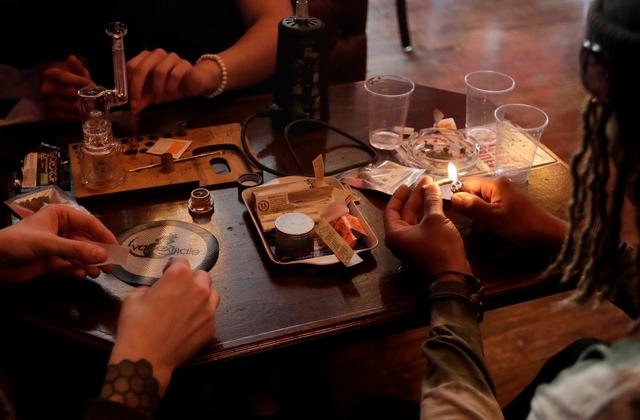The Future of Legal Cannabis Cafés: Market Development Prospects
On October 17, 2018, Canada became the first G7 country to fully legalize the sale, cultivation, and use of cannabis nationwide. Overnight, Canada became a leader in the global legal cannabis market, which generates a combined annual profit of $150 billion. Despite growing momentum for recreational reform in the Americas and Europe, even in Canada and the United States, there are still no dedicated places for consuming cannabis in a social setting. In other words, while residents and visitors can freely drink alcohol in public venues, legal cannabis can only be consumed in private homes. However, reforms addressing this issue are on the horizon.
One of the first customers at Hotbox Lounge in Toronto enjoys cannabis on the venue’s patio, October 17, 2018.
San Francisco’s Example
Take San Francisco, for example. The Barbary Coast Lounge looks like a typical hipster bar, common in such a large and trendy city. However, instead of sipping cocktails and smoothies, patrons are smoking and vaping cannabis at their tables. Although California still prohibits citizens from opening cannabis cafés and smoking lounges, city authorities have passed one of the country’s first laws technically legalizing such establishments at the municipal level.
Since the federal government does not regulate cannabis distribution and consumption, legalization laws are enacted at the regional, county, and municipal levels. As a result, rules regarding the sale, production, and consumption of cannabis can vary dramatically even within the same region. In some places, you can’t consume legally purchased cannabis at the point of sale. Elsewhere, laws restrict public consumption, effectively limiting use to private homes or members-only clubs and stores.
For example, in Las Vegas, Nevada—where cannabis was legalized in 2016—it can only be consumed in private homes or cannabis stores. Smoking in a hotel room downtown can result in eviction and a fine. The same issue exists in Seattle, Washington: you can buy cannabis, but you can only legally consume it at home.
Even in Canada, where cannabis is fully legalized for cultivation and personal use, consumption is limited to private homes or hotels that are cannabis-friendly. The law strictly prohibits smoking in stores, cafés, and even private vehicles.
Shifting Attitudes and Emerging Reforms
Gradually, society is becoming accustomed to cannabis legalization and is leaning toward allowing consumption of the plant and its extracts in public places. Despite current bans, private shops and clubs for therapeutic cannabis use in social settings have existed in California since the 1990s. Barbary Coast opened in 2010 as a private members-only club. Thanks to regional legalization and municipal reforms, the venue will soon need to expand significantly to compete in the growing market of cannabis bars and clubs.
A year ago, a group of Nevada state legislators visited San Francisco to study the local cannabis regulation system. They are now working on a bill to create a similar system in Nevada. In Massachusetts, authorities have announced a partnership program between local cities and other legalized regions to share experiences in municipal reform.
Oregon lawmakers are also interested in legalizing public places for cannabis consumption. They are considering amendments to the “Clean Air Act” to exempt cannabis use from the ban on indoor and public smoking.
New Jersey is reviewing the nation’s first legalization bill that includes provisions for special lounges where people can consume their own cannabis. The bill also allows hotels to designate up to 20% of their rooms for cannabis smokers.
Across the border in Canada, Calgary, Alberta, is leading the way in legalizing cannabis smoking venues. City authorities are already working to modify zoning codes to allow all public establishments to obtain licenses for cannabis smoking areas.
Los Angeles and the Rise of Cannabis Cafés
Los Angeles is making significant progress and is expected to soon surpass San Francisco as the regional leader in legal public cannabis venues. County authorities began reviewing applications for the first cannabis café and bar licenses as early as January last year. Additionally, the independent city of West Hollywood amended its municipal code in April to allow cannabis cafés, immediately launching the formal business certification process. As a result, by the start of the year, the city had 16 operating cannabis cafés: half offer only snacks and drinks with cannabis extracts, while the others allow customers to freely consume their own cannabis products. By year’s end, the number of such venues is expected to at least double.
Political Resistance and Future Outlook
In most cases, reform is slowed by social conservatives from the Republican Party. The party’s Washington branch fought with the state attorney general for a long time before passing a law that technically criminalizes any cannabis use on commercial premises. Fortunately, more progressive Republicans are now recognizing the social and financial benefits of cannabis legalization and reforms that expand business freedoms. It’s clear that in the next couple of years, these voices will be able to overcome resistance from “dinosaurs” who still believe old propaganda about the dangers of cannabis.



